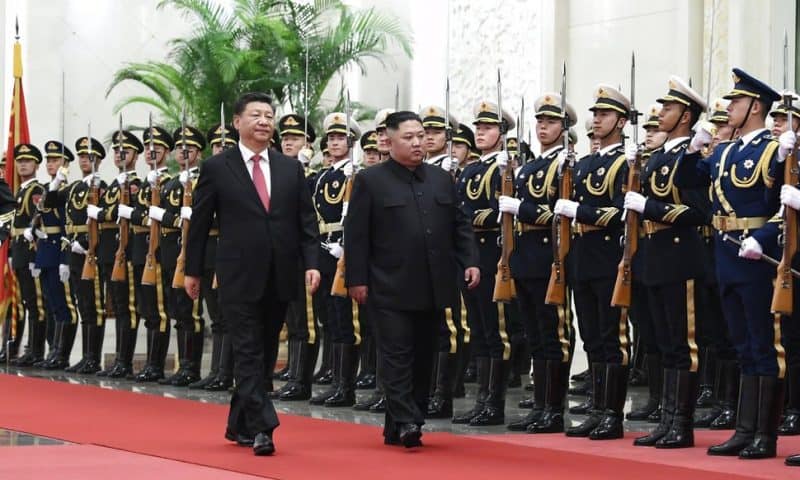A exchange between Xi Jingping and Kim Jong Un implies North Korea may restart nuclear weapons or ICBM tests if Biden does not heed an implicit warning.
CHINA ON MONDAY FIRED A diplomatic warning shot at the U.S. through a new agreement between President Xi Jinping and North Korean leader Kim Jong Un that in reality threatens grave security challenges for the U.S. in the near future.[
Xi’s office announced Monday morning that he and Kim had traded seemingly benign messages through two interlocutors from each country during a meeting in Beijing earlier in the day. A report in Chinese state news said the two leaders agreed “to uphold the political settlement of the Korean Peninsula issue and preserve peace and stability on the peninsula, so as to make new contributions to regional peace, stability, development and prosperity.”
Analysts say the statement represents a clear threat to President Joe Biden not to continue the policies of the Trump administration or else face drastic consequences, reminding Washington that China continues to hold outsized influence in North Korea and the extent to which Pyongyang decides to restart tests of its nuclear weapons or intercontinental ballistic missiles depends on how aggressive an approach the U.S. takes.
“China is very worried that the Biden administration will implement its very own containment strategy like during the Trump years. That means Beijing needs as many geopolitical cards to play in an effort to make Biden think twice – enter North Korea,” says Harry Kazianis, senior director of Korean Studies at the Center for the National Interest. “The message is clear: If Biden wants to push back on us, we have a North Korea card to play and we will play it—and make you pay dearly.”
The timing of the new threat is made all the more conspicuous by the aggressive statement Kim’s powerful sister issued last week, returning North Korea to international attention with pledges of new violence amid an apparent stalemate in talks between Pyongyang and the U.S. Both countries have since confirmed that North Korea has not responded to diplomatic outreach from both the Trump and Biden administrations for more than a year.
Monday’s exchange comes days after a fiery meeting last week between top American and Chinese diplomats in Anchorage, Alaska. Both sides appeared eager for their domestic and international audiences to see the hard line each plans to take against each other, and so the usually staid and brief opening remarks before reporters on Thursday almost immediately devolved into a 90-minute exchange of rants between both sides publicly blaming the other for regional and, at times, global instability.
The closed-door sessions, however, were reportedly more productive, and indeed the Chinese Communist Party through its state news expressed publicly a sense of optimism after the talks concluded late Friday.
“The two countries have withstood the impact of confrontation at the opening, and the two countries’ public opinions seem to have quickly adapted to the situation. We believe there are also positive signs in this,” according to an op-ed in the English-language Global Times on Friday. A separate headline Monday morning read, “Alaska talks a good beginning to amplify positive factors in China-US ties: expert.”
The seemingly schizophrenic response from the Chinese delegation was widely seen as a classic example of Chinese diplomacy: The high-profile presence of “wolf warrior” envoys who will not be cowed by perceived American bullying, followed by the temperate patience of an autocratic government that plans in terms of decades or centuries, not in months or years as the leaders of an elected democracy are forced to do.
Monday’s threats pile on to that strategy with a reminder that China must, to a certain extent, buy into any punishments the U.S. exacts on North Korea for them to have any effect. Beijing buys 90 percent of North Korea’s exports and plays an outsized role in its response to the coronavirus pandemic – influence that can help offset any “maximum pressure” attempts from elsewhere.
Secretary of State Antony Blinken specifically cited this influence at the Anchorage summit while encouraging China to help contain North Korea’s ambitions, saying its “unique” relationship affords it “tremendous” influence over Pyongyang.
“China will do what it can to spin the talks at home as a win – they have no choice,” Kazianis says. “However, look for Beijing to try and cause as much trouble as it can in the months ahead to try and prove to Biden he cannot stop their rise – a dangerous situation to say the least.”

